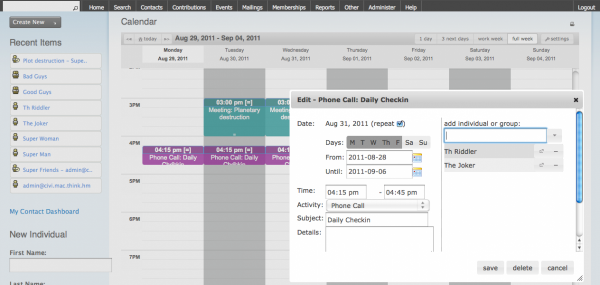When developing with CiviCRM, one often prepares a development-build on your workstation which includes several git repositories, e.g.
Blog posts by totten
We've marked a new release of civix. Notable changes/improvements:
CiviCase is generally described as "a container for activities". As a container, it's well-suited to two scenarios:
CiviCRM configuration is largely driven through the web interface and the database: if an administrator wants to add a new "report" or new "relationship type", he can accomplish this with a few clicks of the web interface. The new item is inserted into the database and immediately becomes live. This is great for web-based administration, but it's inconvenient for developers: if a developer writes a module or extension that registers something in the database, then he needs to write an installation routine to insert the item (and an uninstallation routine to delete the item). CiviCRM 4.2+ includes a better way: use the API and hook_civicrm_managed. This technique is already used in "civix" based extensions, but it also works with Drupal modules, Joomla plugins, etc.
IMPORTANT: You do NOT need to upgrade CiviCRM to remove this vulnerability. See "Prevent Attacks: Delete the Vulnerable File" below.
As of March 1st, the official source-code repository of CiviCRM has switched from Subversion to Github. Git and Github provide a number of advantages:
Brian Shaughnessy (lcdweb), who has been working with the New York State Senate's CiviCRM project, recently raised the issue of simultaneous editing: What happens when two users simultaneously make changes to same contact record? We've held a few discussions on IRC to examine the issue and draft some solutions. We would appreciate further feedback and ideas on how to address the issue.
The ProblemAs described by Brian:
Many CiviCRM customizations have been packaged and distributed as Drupal modules. This can be desirable when a customization delves into both the CMS and CRM functionality, but -- when a customization focuses only on CiviCRM -- Drupal modules are a drag: they need to be patched for CMS upgrades (D6/D7) as well as CRM upgrades (Civi 2.x/Civi 3.x), and they don't work with CiviCRM's other CMS's (Joomla and WordPress). This article introduces a proof-of-concept solution.
CiviCRM 3.4.x and 4.0.x introduced API v3, a more consistent set of interfaces for integrating with CiviCRM using PHP, Smarty, Javascript, and REST. Building on this consistent core API, recent CiviCRM updates have introduced even more ways to manipulate your data -- such as chaining and CSV batch importing.
Thus, functions implemented according to the API v3 conventions can be invoked several different ways. If you would like to leverage this infrastructure for use with a new or customized API call, then download the latest release. With 3.4.6/4.0.6, external developers can expose API functions for new entities, new actions, and even generic actions.
Several CiviCRM users have expressed an interest in managing CiviCRM activities with a smooth, interactive calendar screen. Since calendaring can be a complex topic, we've put together a basic, working calendar to facilitate discussion. The prototype resembles the calendar included in other relationship-management tools:


